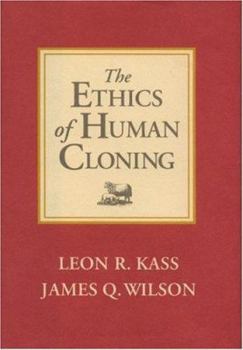The Ethics of Human Cloning
Select Format
Select Condition 
Book Overview
Today biological science is rising on a wall of worry. No other science has advanced more dramatically during the past several decades or yielded so many palpable improvements in human welfare. Yet,... This description may be from another edition of this product.
Format:Hardcover
Language:English
ISBN:0844740500
ISBN13:9780844740508
Release Date:January 1998
Publisher:AEI Press
Length:122 Pages
Weight:0.65 lbs.
Dimensions:0.7" x 5.3" x 7.5"
Customer Reviews
5 ratings
The Ethics of Human Cloning
Published by Thriftbooks.com User , 14 years ago
Fast delivery, I needed this book for my Bioethics class and got it just in time. Thanks!
Good read for all.
Published by Thriftbooks.com User , 17 years ago
On February 23, 1997, Dr. Ian Wilmut announced that his research team at the Roslin Institute of Edinburgh, Scotland had cloned a 6 year old ewe. This announcement produced hype and hysteria in all directions. Leon R. Kass and James Q. Wilson wrote essays regarding their opinions of the potential consequences, both good and bad.Leon R. Kass' essay "Wisdom and Repugnance"(The Weekly Standard, May 26, 1997) focuses on what lead up to cloning and why it will turn our lives into that of Brave New World. James Q. Wilson's essay "The Paradox of Cloning"(The New Republic, June 2, 1997), attacks the issue from another angle. Wilson acknowledges the philosophical and theological issues, but open-mindedly sees no problem with clones being provided for married 2-parent families. Both essays are very engaging and cover many angles. I believe that Kass' argument is more explicit and practical than Wilson's. Wilson merely states that cloning will happen and it will be abused, so why not establish some good from it. Kass also covers more in-depth the many sides of cloning and even, in a way, deduces what Wilson says. The information in the book is useful and I recommend it to anyone that needs a crash course on the issue of cloning. I also recommend it on the basis that cloning is an issue that affects everyone and it is important to be informed on the hard decisions facing our times.
The Two Sides of the Clone
Published by Thriftbooks.com User , 20 years ago
This slim volume is an excellent introduction to the multifaceted issues involved in cloning.There are two types of cloning. One involves harvesting stem cells from embryos ("therapeutic cloning"). These are the biological equivalent of a template. They can develop into any kind of mature functional cell and thus help cure many degenerative and auto-immune diseases. The other kind of cloning is much decried in popular culture - and elsewhere - as the harbinger of a Brave, New World. A nucleus from any cell of a donor is embedded in an egg whose own nucleus has been removed. The egg is then implanted in a woman's womb and a cloned baby is born nine months later. Biologically, the cloned infant is a replica of the donor. Cloning is often confused with other advances in bio-medicine and bio-engineering - such as genetic selection. It cannot - in itself - be used to produce "perfect humans" or select sex or other traits. Hence, some of the arguments against cloning are either specious or fuelled by ignorance. It is true, though, that cloning, used in conjunction with other bio-technologies, raises serious bio-ethical questions. Scare scenarios of humans cultivated in sinister labs as sources of spare body parts, "designer babies", "master races", or "genetic sex slaves" - formerly the preserve of B sci-fi movies - have invaded mainstream discourse. Still, cloning touches upon Mankind's most basic fears and hopes. It invokes the most intractable ethical and moral dilemmas. As an inevitable result, the debate is often more passionate than informed. Sam Vaknin, author of "Malignant Self Love - Narcissism Revisited"
Insightful
Published by Thriftbooks.com User , 21 years ago
At the time this book was written no one had yet claimed to have cloned a human being and the debate was raging, should science even try? Many of the pros and cons that are being discussed today were being discussed 4 years ago when this book was written, shortly after Dolly, the cloned sheep was born. The many impacts of cloning should be contemplated upon openly so people can make up their minds on this touchy subject. Some of the impacts can not be thought of at this time. This book covers not only the biological impacts but many of the social impacts that could present themselves. Should we allow cloning? Limit it? Make it illegal totally? Legal for research? This is an insightful book that covers both sides of the debate. I was surprised by some of the conclusions and not by others. I disagreed with some and agreed with others. Thought of some points and not others. This is a good start for the debate on human cloning.
cloning
Published by Thriftbooks.com User , 23 years ago
I found The Ethics of Human Cloning an inciteful view into this controversial issue. It was quite hard to find literature that contained both the fors and againsts of cloning humans (without being overly biased.) This book is great for anyone who is searching for useful information on the ethics in regards to cloning of humans. It was extremely helpful for me as a reference for university assignments, but is also great for anyone with a general interest in this topic.





